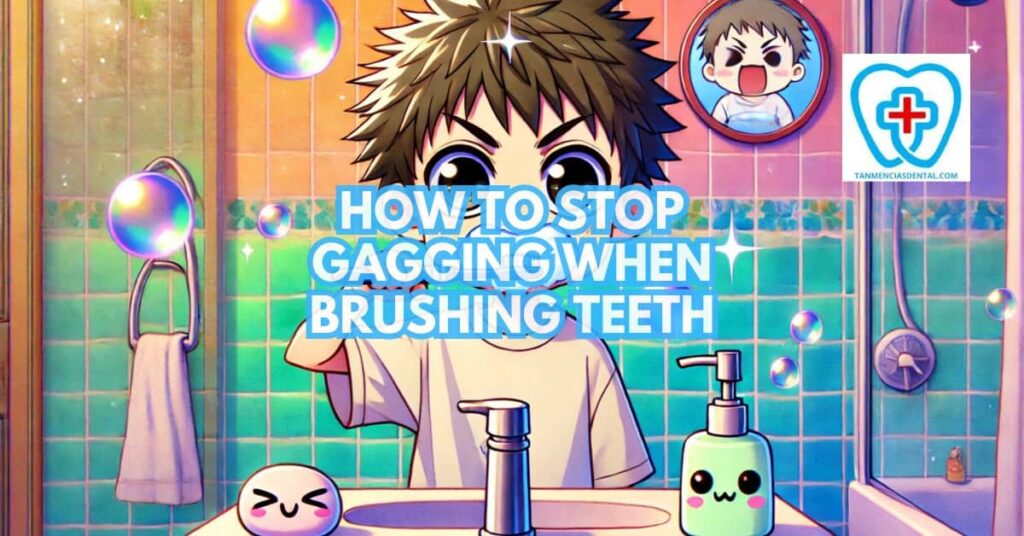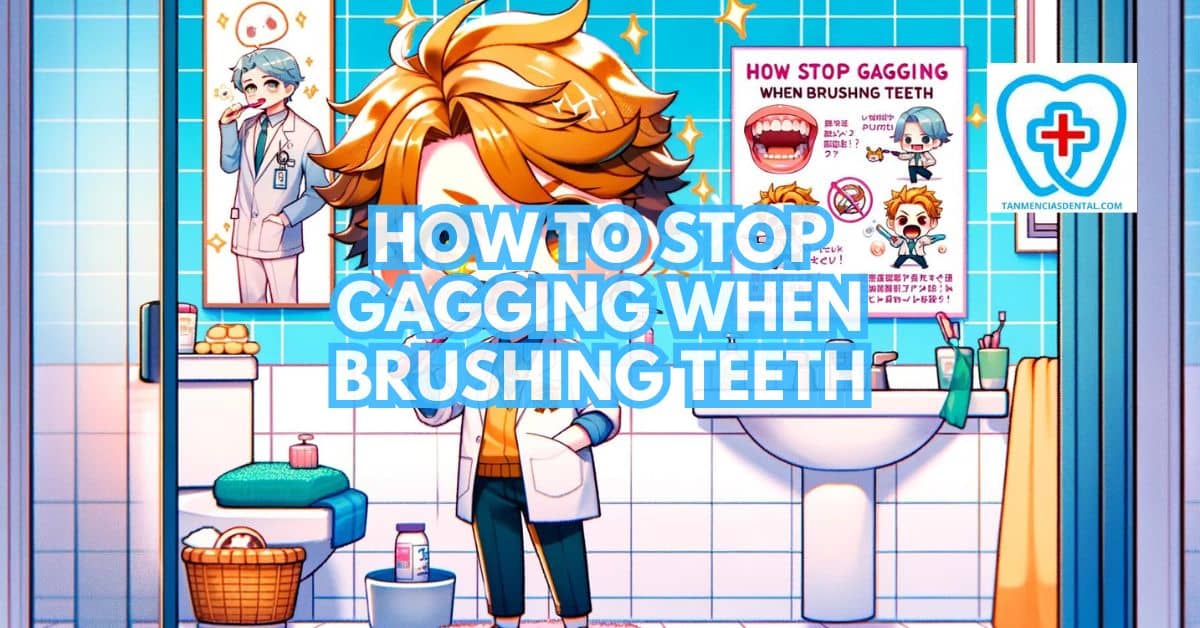The gag reflex is a natural reaction that helps protect the throat, but for some, it can make brushing teeth difficult.
If you struggle with gagging while brushing, it can feel frustrating and uncomfortable.
Understanding how to stop gagging when brushing teeth involves knowing what triggers this response and using simple techniques to manage it.
By making small changes to your brushing routine, you can reduce the sensitivity of your gag reflex.
We’ll help you find ways to brush your teeth without the discomfort of gagging.
1. Choose the Right Toothbrush to Reduce Gagging
Choosing the right toothbrush is key to reducing gagging when brushing teeth in the morning, especially for those with a sensitive pharyngeal reflex.
A toothbrush with a smaller head can help avoid contact with the tonsils and other sensitive areas at the back of the mouth, which often trigger the gag reflex.
Soft bristles are gentler on the gums and reduce irritation, making it less likely for the pharyngeal reflex to activate.
Electric toothbrushes are also useful since they require less manual brushing, helping you avoid deep or forceful motions that could lead to gagging.
Look for a toothbrush that feels easy to grip, as better control helps reduce accidental brushing too far back.
Additionally, toothbrushes designed specifically for sensitive users often come with ergonomic designs that further help limit gagging.
Making these adjustments can greatly improve your morning routine and make brushing more comfortable.
🦷 Is It Safe to Brush Your Teeth Before Wisdom Teeth Surgery? Essential Tips for Pre-Surgery Prep
2. Master Brushing Technique to Avoid Gagging
Mastering your brushing technique can help prevent gagging while brushing teeth, especially if you have an overactive gag reflex.
Start by brushing the front teeth first, as these areas are less likely to trigger the reflex, and slowly work your way towards the back of the mouth.
This approach allows your body to adjust gradually without feeling the urge to choke or gag.
Holding the toothbrush at a 45-degree angle to your gums helps avoid unnecessary contact with sensitive areas like the tongue or throat, which can activate the gag reflex.
If your reflex is highly sensitive, keep brushing sessions short at first and extend them gradually as your comfort improves.
Using gentle, controlled motions instead of aggressive strokes can further reduce the chances of gagging.
Over time, these adjustments will help you build tolerance and brush more effectively without discomfort.
🦷 Brushing and Flossing with Braces: Your Ultimate Guide to Achieving a Radiant Smile
3. Gradually Desensitize Your Tongue
Desensitizing your tongue can be an effective way to manage gagging.
Start by gently touching the tip of your tongue with your toothbrush, and slowly increase the area of contact over time.
Do this outside of your normal brushing routine in a relaxed setting where you can stop immediately if you feel uncomfortable.
As you become accustomed to the sensation, gently brush farther back on your tongue each time.
It’s a slow process, but increasing your tongue’s tolerance can help reduce gagging during brushing.
🦷 Can You Brush Your Teeth After a Filling? Essential Dos and Don’ts for Optimal Care
4. Find a Flavor You Love That Doesn’t Trigger Gagging
The flavor and scent of toothpaste can be a significant trigger for gagging.
Opt for toothpastes with milder flavors, such as vanilla or mild mint, which are less likely to provoke a gag reflex.
Non-mint flavors like strawberry or bubblegum, often marketed for children, can also be good alternatives for sensitive individuals.
Some brands offer flavorless toothpastes, which might eliminate this trigger altogether.
Experimenting with different types until you find one that feels comfortable can make brushing a more pleasant experience.
🦷 What’s the Deal with Mouth Peels After Brushing? Let’s Uncover the Truth

5. Use Desensitizing Toothpaste and Mouthwash
Desensitizing toothpastes and mouthwashes contain special ingredients that help reduce mouth sensitivity.
These products can make brushing your teeth more comfortable by calming your gag reflex.
In time, regular use can gradually lessen how easily you gag when brushing.
Ingredients like potassium nitrate and fluoride are effective in making your mouth less sensitive.
Try using a desensitizing toothpaste or mouthwash to help make your daily brushing routine easier and more pleasant.
🦷 Can a Tooth Abscess Be Fatal? Understanding the Risks and Warning Signs
6. Breathe Through Your Nose to Control Gagging
Breathing techniques can play a crucial role in managing gag reflexes.
Focus on taking slow, deep breaths through your nose while you brush.
This method helps keep the throat relaxed and reduces the likelihood of triggering a gag reflex.
Practicing breathing exercises regularly can also increase your control over gag reflexes over time.
If you find yourself starting to gag, pause your brushing and concentrate on deep nasal breathing to calm the reflex.
🦷 What Ages Do Pediatric Dentists Serve? A Comprehensive Look at Their Scope of Care
7. Distract Yourself While Brushing
Distracting your mind can effectively reduce the sensitivity of your gag reflex.
Try engaging in activities that occupy your mind, such as listening to music or watching television while you brush.
Another technique is to perform a mental task like counting backwards from 100 or planning your day.
Physical distractions, like tapping your foot or squeezing a stress ball with your free hand, can also help.
These distractions can make it easier to brush without focusing too much on the sensation that triggers gagging.
🦷 Can You Brush Your Teeth Before Surgery? Key Pre-Operative Guidelines You Should Know
8. Morning Brushing vs. Night Brushing: Timing Your Routine
Your gag reflex may be more sensitive at different times of the day.
Some people find that their gag reflex is more pronounced in the morning, possibly due to an empty stomach or the body’s slower start.
If this is the case, shifting heavier brushing to nighttime, when the reflex might be less sensitive, could be beneficial.
Experiment with your brushing schedule to find what time of day triggers the least gagging for you.
Adapting your routine can make brushing a more comfortable and effective practice.
🦷 Brushing After Wisdom Teeth Surgery: Essential Tips for Post-Op Oral Care
9. Mind-Over-Matter Techniques to Overcome Gagging
Psychological techniques can be powerful tools in managing the gag reflex.
Visualization exercises, where you imagine yourself brushing without discomfort, can mentally prepare you for the task.
Positive self-talk and affirmations reinforce your ability to control the reflex and brush effectively.
Deep relaxation techniques like meditation before brushing can also reduce physical responses like gagging.
Employing these strategies consistently can alter your response over time, making brushing a less daunting task.
🦷 Why Do You Still Have Bad Breath After Brushing? Let’s Investigate the Causes
10. Take it Slow: Progress Over Perfection in Brushing
It’s important to acknowledge that managing a sensitive gag reflex is a gradual process.
Focus on making incremental progress, such as increasing the brushing time little by little or moving the brush slightly further back in your mouth as you become more comfortable.
Celebrate small successes, like a day without gagging, to build confidence.
Avoid being hard on yourself if progress seems slow; consistent effort is more important than quick results.
Remember, the goal is to make brushing a regular, comfortable part of your day, not to perfect it all at once.
🦷 Should You Use Mouthwash Before or After Brushing? Decoding the Best Oral Hygiene Routine
11. Talk to Your Dentist About Persistent Gag Reflex
If your gag reflex continues to be a significant obstacle despite your efforts, consulting your dentist is a crucial step.
Dentists can offer professional advice tailored to your specific situation and may suggest special tools or techniques to help manage your gag reflex.
They can also check for underlying conditions that might be exacerbating your gagging.
Sometimes, professional cleaning by a dentist can be less triggering than brushing at home, providing some relief.
Don’t hesitate to seek help—it’s an important part of maintaining your oral health.
🦷 How Do Holistic Dentists Approach Cavities? Exploring Natural Treatments and Solutions
👨⚕️ Conclusion
Successfully managing your gag reflex when brushing your teeth can significantly improve your oral hygiene and overall well-being.
By choosing the right tools, adopting effective techniques, and being patient with your progress, you can build a brushing routine that feels comfortable and effective.
Keep experimenting with different strategies to find what works best for you, and remember that this is a common issue many people face.
With persistence and the right approach, you can transform tooth brushing from a challenge into a routine part of your day.
😊 Self-Promotion
Visit us at Tan-Mencias Dental Clinic, your friendly neighborhood dental care provider in Parang, Marikina City!
Whether you’re looking to enhance your smile or need routine dental care, our expert team is here to help you with top-notch services.
For any questions or to schedule an appointment, feel free to call us at 9171451074.
You can also reach out through our Facebook page or use the contact form on our website.
We’re excited to help you achieve the healthy, beautiful smile you deserve!

